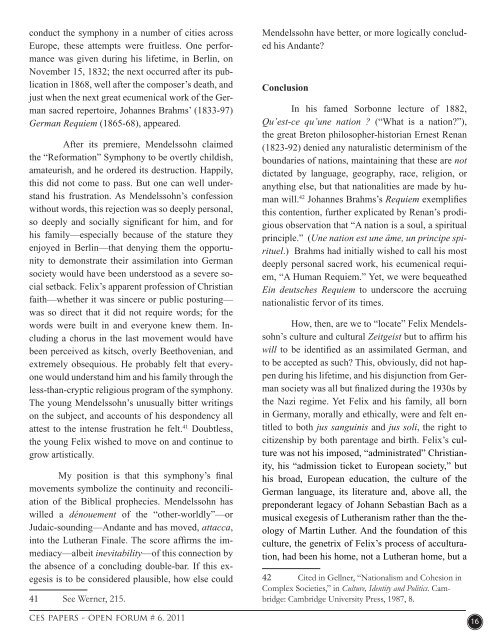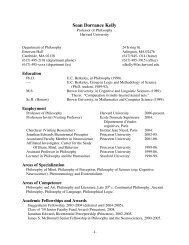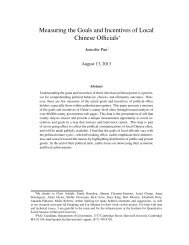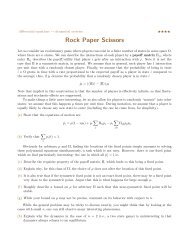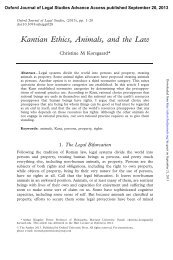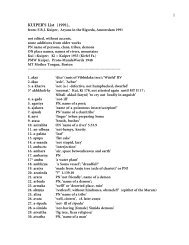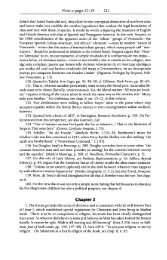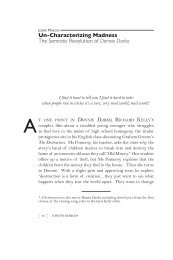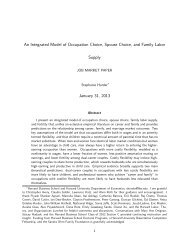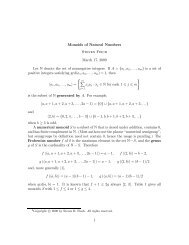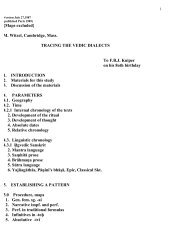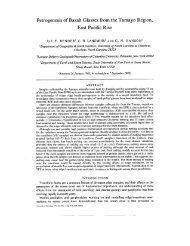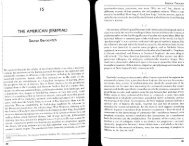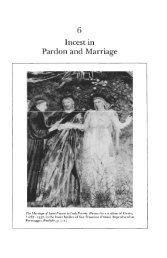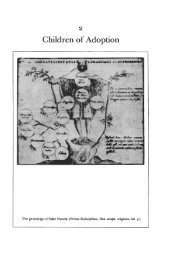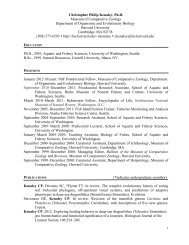references - people.fas.harvard.edu - Harvard University
references - people.fas.harvard.edu - Harvard University
references - people.fas.harvard.edu - Harvard University
Create successful ePaper yourself
Turn your PDF publications into a flip-book with our unique Google optimized e-Paper software.
conduct the symphony in a number of cities across<br />
Europe, these attempts were fruitless. One performance<br />
was given during his lifetime, in Berlin, on<br />
November 15, 1832; the next occurred after its publication<br />
in 1868, well after the composer’s death, and<br />
just when the next great ecumenical work of the German<br />
sacred repertoire, Johannes Brahms’ (1833-97)<br />
German Requiem (1865-68), appeared.<br />
After its premiere, Mendelssohn claimed<br />
the “Reformation” Symphony to be overtly childish,<br />
amateurish, and he ordered its destruction. Happily,<br />
this did not come to pass. But one can well understand<br />
his frustration. As Mendelssohn’s confession<br />
without words, this rejection was so deeply personal,<br />
so deeply and socially signifi cant for him, and for<br />
his family—especially because of the stature they<br />
enjoyed in Berlin—that denying them the opportunity<br />
to demonstrate their assimilation into German<br />
society would have been understood as a severe social<br />
setback. Felix’s apparent profession of Christian<br />
faith—whether it was sincere or public posturing—<br />
was so direct that it did not require words; for the<br />
words were built in and everyone knew them. Including<br />
a chorus in the last movement would have<br />
been perceived as kitsch, overly Beethovenian, and<br />
extremely obsequious. He probably felt that everyone<br />
would understand him and his family through the<br />
less-than-cryptic religious program of the symphony.<br />
The young Mendelssohn’s unusually bitter writings<br />
on the subject, and accounts of his despondency all<br />
attest to the intense frustration he felt. 41 Doubtless,<br />
the young Felix wished to move on and continue to<br />
grow artistically.<br />
My position is that this symphony’s fi nal<br />
movements symbolize the continuity and reconciliation<br />
of the Biblical prophecies. Mendelssohn has<br />
willed a dénouement of the “other-worldly”—or<br />
Judaic-sounding—Andante and has moved, attacca,<br />
into the Lutheran Finale. The score affi rms the immediacy—albeit<br />
inevitability—of this connection by<br />
the absence of a concluding double-bar. If this exegesis<br />
is to be considered plausible, how else could<br />
41 See Werner, 215.<br />
ces papers - open forum # 6, 2011<br />
Mendelssohn have better, or more logically concluded<br />
his Andante?<br />
Conclusion<br />
In his famed Sorbonne lecture of 1882,<br />
Qu’est-ce qu’une nation ? (“What is a nation?”),<br />
the great Breton philosopher-historian Ernest Renan<br />
(1823-92) denied any naturalistic determinism of the<br />
boundaries of nations, maintaining that these are not<br />
dictated by language, geography, race, religion, or<br />
anything else, but that nationalities are made by human<br />
will. 42 Johannes Brahms’s Requiem exemplifi es<br />
this contention, further explicated by Renan’s prodigious<br />
observation that “A nation is a soul, a spiritual<br />
principle.” (Une nation est une âme, un principe spirituel.)<br />
Brahms had initially wished to call his most<br />
deeply personal sacred work, his ecumenical requiem,<br />
“A Human Requiem.” Yet, we were bequeathed<br />
Ein deutsches Requiem to underscore the accruing<br />
nationalistic fervor of its times.<br />
How, then, are we to “locate” Felix Mendelssohn’s<br />
culture and cultural Zeitgeist but to affi rm his<br />
will to be identifi ed as an assimilated German, and<br />
to be accepted as such? This, obviously, did not happen<br />
during his lifetime, and his disjunction from German<br />
society was all but fi nalized during the 1930s by<br />
the Nazi regime. Yet Felix and his family, all born<br />
in Germany, morally and ethically, were and felt entitled<br />
to both jus sanguinis and jus soli, the right to<br />
citizenship by both parentage and birth. Felix’s culture<br />
was not his imposed, “administrated” Christianity,<br />
his “admission ticket to European society,” but<br />
his broad, European <strong>edu</strong>cation, the culture of the<br />
German language, its literature and, above all, the<br />
preponderant legacy of Johann Sebastian Bach as a<br />
musical exegesis of Lutheranism rather than the theology<br />
of Martin Luther. And the foundation of this<br />
culture, the genetrix of Felix’s process of acculturation,<br />
had been his home, not a Lutheran home, but a<br />
42 Cited in Gellner, “Nationalism and Cohesion in<br />
Complex Societies,” in Culture, Identity and Politics. Cambridge:<br />
Cambridge <strong>University</strong> Press, 1987, 8.<br />
16


